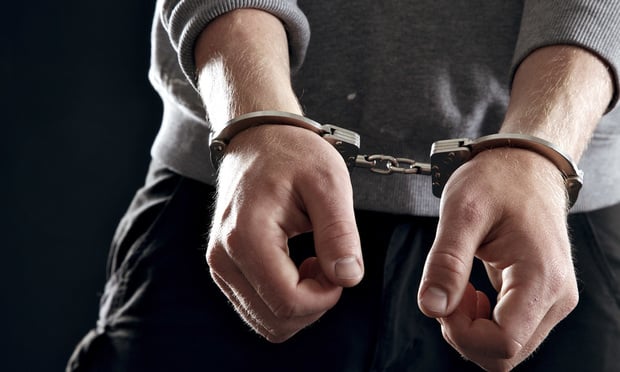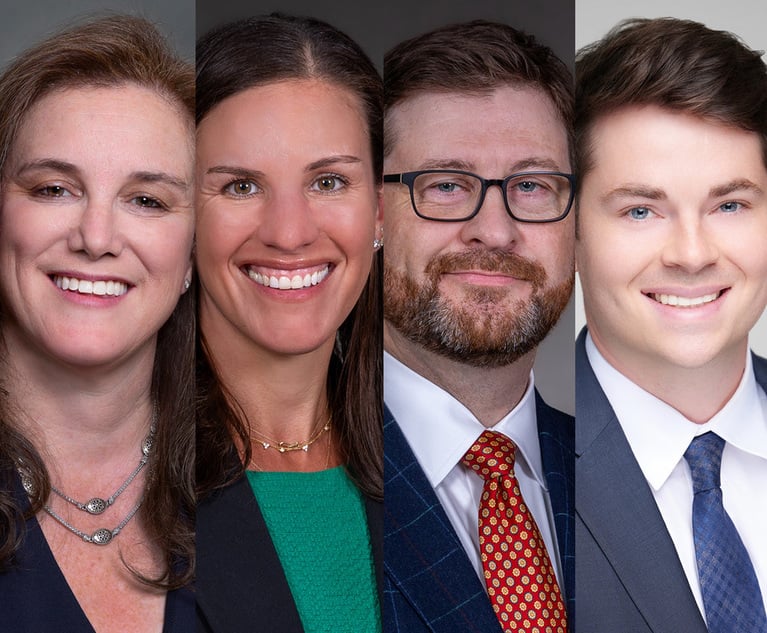Pardons: An Essential, Moral Response to Mass Incarceration
It's impossible these days not to be thinking about implicit (and explicit) bias and the wide discretion exercised by all actors at all levels in our criminal justice system.
September 20, 2019 at 11:01 AM
7 minute read
 Handcuffed Man
Handcuffed Man
Black Lives Matter. Colin Kaepernick and Malcolm Jenkins. Starbucks' restrooms. Meek Mill. "13th." "Just Mercy," "White Rage," "The New Jim Crow." The New York Times' "1619 Project."
It's impossible these days not to be thinking about implicit (and explicit) bias and the wide discretion exercised by all actors at all levels in our criminal justice system. This is a very big issue for Pennsylvania: our state ranks among the highest in the country for criminal prosecutions commenced, people incarcerated in jails and prisons, people under "carceral control" (probation and parole) and citizens who have fully completed their sentences.
It's been estimated that one in three Pennsylvanians has a criminal record. In low-income, high-arrest neighborhoods of Philadelphia, that number approaches 60%. Criminal records are used every day—often in violation of the law—to deny people jobs, housing, credit, entry into training programs, trades and professional programs, and other opportunities for which they are fully qualified.
On the individual level, this is truly unfair for people who have "paid their fine and done their time." The president of the Samuel S. Fels Fund, Sarah Martinez-Hoffman, has called it "crushing that what someone was charged with 10 or 15 years ago, very often when they were young adults, can completely wipe out everything that person has done since then to improve themselves, even if they have accepted responsibility." The United Way of Greater Philadelphia and Southern New Jersey has identified removing criminal records as a critical "impact strategy" for reducing inter-generational poverty.
Philadelphia city solicitor Marcel Pratt has called eliminating criminal records "a critical and essential neighborhood investment strategy." Addressing the Philadelphia Bar Association's board of governors, he spoke of the costs they impose on us all: "Every year, we as a city—and you as its taxpayers—invest tens of millions of dollars in efforts to combat poverty. We know that the best way for people to get out of poverty is for them to have jobs and get themselves out of poverty. And something else we know: no matter how good the workforce development program is, no matter how committed the person is to success, all of that means nothing if they cannot get the interview for the job, or the offer, or the big step up into a new career because of their criminal record."
The Pew Foundation recently documented that 91% of those being released from state prisons to Philadelphia return to poor neighborhoods. Criminal records are decimating families and neighborhoods, and making it impossible for workforce development and neighborhood investment strategies to succeed. The most recent census figures show that more areas of our city are sinking into deep and persistent poverty.
Since the time of William Penn, the only way to get a conviction erased is through a pardon from the governor. For equally as long, eligibility for pardons has been closely linked to a demonstration that the individual has been rehabilitated. Civic forgiveness is awarded only to those who society is convinced will never sin again. Historically, that is very, very few. Of the millions of Pennsylvanians who have been convicted of a crime, the most pardons awarded in any one year has been just 286.
It's time for a new approach to pardons—one that restores hope to people who have been living among us for years who have proven they deserve the chance to compete again for opportunities without being chained to the worst days of their lives.
That change has begun. And it's moving quickly.
Thanks to the statewide board of pardons, Pennsylvania is actually leading the nation in pardon reform. Under the leadership of board chairman, Lieutenant Gov. John Fetterman, and board secretary Brandon Flood, and with the support of Attorney General Josh Shapiro (a member of the board), all fees to apply for a pardon have been eliminated. The application form has been shortened, it's been written in words that are easier to understand, it no longer includes questions that the board agreed should not be asked, and it's now available online. The time being taken to process and investigate the application has been shortened from four long years to two, and there is hope that, for many cases, the waiting period may be shortened to a single year.
This is a remarkable record. The Philadelphia Bar Association's board of governors is to be commended for having unanimously adopted resolutions suggesting different ways that the board of pardons could move forward on this path. More reforms are in process.
And there is more good news: despite the common perception that the possibility of a pardon is so remote that applying is not worth the effort, a study by the Economy League has confirmed that in recent years, over 50% of those who applied have actually received a pardon from the governor. Bottom line, people now have a 50-50 chance once they get their application filed.
Since its founding in 2011, Philadelphia Lawyers for Social Equity (PLSE) has been focused on the terrible harms inflicted by criminal history records. Late last year, we started the pardon project with the goal within five years of helping to generate 2,000 quality pardon applications each year from low-income Philadelphians—a massive increase over current numbers, but a very far stretch from the 100,000 low-income Philadelphians we estimate have turned their lives around and today merit the restoration of hope that only a pardon can bring.
How can we reach and help them? Unlike most pro bono programs, the pardon project is not limited to lawyers: virtually anyone with compassion and persistence can help, once they've learned the rules of the game. We aim to help people complete the application in the best way they can, not represent them through the whole process. Indeed, lawyers rarely speak at pardon board hearings.
The average Philadelphian reads at a fifth-grade level, and for a great many of them, any official government form is a challenge, especially one that threatens punishment for misstatements. Those who have experience in the criminal justice system are understandably concerned about going into the Criminal Justice Center, through its police security, to obtain copies of the required court documents. Few have the ability to "Describe the incident and how you were involved. Where were you, what exactly did you do, and how were you caught?"—especially those who pleaded guilty to a crime primarily to avoid the long wait in jail (for those unable to post bond) and the uncertainties of trial. Few have the ability to write the essay explaining who they are today, where they're headed, how their experience in the criminal justice system has changed them, and what difference a pardon would make.
PLSE's pardon project leads to and works through staff and volunteers of communities of faith and social service agencies that are already trusted in impacted neighborhoods. PLSE needs lawyers, paralegals and others who have been trained in the pardon process not to provide legal representation, but to train those who are willing to coach, support and encourage, to give workshops and to answer questions. That puts the knowledge and the power in the neighborhood, which is the only possibility we have of reaching the 100,000 who need our help today for better lives tomorrow. You can read more about the strategy here: http://plsephilly.org/what-we-do/pardons/
We believe what we are doing here in Philadelphia and in Pennsylvania will change the pardon process around the country. Once again, as in so many different ways over two-and-a-half centuries, Philadelphia lawyers are taking the lead in creating a fair and just society. Join us.
Carl (Tobey) Oxholm III is the interim executive director of Philadelphia Lawyers for Social Equity. He played a leadership role in the founding of Philadelphia VIP, Homeless Advocacy Project, Consumer Bankruptcy Assistance Project and Philadelphia Law Diversity Group.
This content has been archived. It is available through our partners, LexisNexis® and Bloomberg Law.
To view this content, please continue to their sites.
Not a Lexis Subscriber?
Subscribe Now
Not a Bloomberg Law Subscriber?
Subscribe Now
NOT FOR REPRINT
© 2025 ALM Global, LLC, All Rights Reserved. Request academic re-use from www.copyright.com. All other uses, submit a request to [email protected]. For more information visit Asset & Logo Licensing.
You Might Like
View All
Smaller Firms in 'Growth Mode' as Competition, Rates Heat Up


Trending Stories
- 1Judge Sides With Retail Display Company in Patent Dispute Against Campbell Soup, Grocery Stores
- 2Is It Time for Large UK Law Firms to Begin Taking Private Equity Investment?
- 3Federal Judge Pauses Trump Funding Freeze as Democratic AGs Launch Defensive Measure
- 4Class Action Litigator Tapped to Lead Shook, Hardy & Bacon's Houston Office
- 5Arizona Supreme Court Presses Pause on KPMG's Bid to Deliver Legal Services
Who Got The Work
J. Brugh Lower of Gibbons has entered an appearance for industrial equipment supplier Devco Corporation in a pending trademark infringement lawsuit. The suit, accusing the defendant of selling knock-off Graco products, was filed Dec. 18 in New Jersey District Court by Rivkin Radler on behalf of Graco Inc. and Graco Minnesota. The case, assigned to U.S. District Judge Zahid N. Quraishi, is 3:24-cv-11294, Graco Inc. et al v. Devco Corporation.
Who Got The Work
Rebecca Maller-Stein and Kent A. Yalowitz of Arnold & Porter Kaye Scholer have entered their appearances for Hanaco Venture Capital and its executives, Lior Prosor and David Frankel, in a pending securities lawsuit. The action, filed on Dec. 24 in New York Southern District Court by Zell, Aron & Co. on behalf of Goldeneye Advisors, accuses the defendants of negligently and fraudulently managing the plaintiff's $1 million investment. The case, assigned to U.S. District Judge Vernon S. Broderick, is 1:24-cv-09918, Goldeneye Advisors, LLC v. Hanaco Venture Capital, Ltd. et al.
Who Got The Work
Attorneys from A&O Shearman has stepped in as defense counsel for Toronto-Dominion Bank and other defendants in a pending securities class action. The suit, filed Dec. 11 in New York Southern District Court by Bleichmar Fonti & Auld, accuses the defendants of concealing the bank's 'pervasive' deficiencies in regards to its compliance with the Bank Secrecy Act and the quality of its anti-money laundering controls. The case, assigned to U.S. District Judge Arun Subramanian, is 1:24-cv-09445, Gonzalez v. The Toronto-Dominion Bank et al.
Who Got The Work
Crown Castle International, a Pennsylvania company providing shared communications infrastructure, has turned to Luke D. Wolf of Gordon Rees Scully Mansukhani to fend off a pending breach-of-contract lawsuit. The court action, filed Nov. 25 in Michigan Eastern District Court by Hooper Hathaway PC on behalf of The Town Residences LLC, accuses Crown Castle of failing to transfer approximately $30,000 in utility payments from T-Mobile in breach of a roof-top lease and assignment agreement. The case, assigned to U.S. District Judge Susan K. Declercq, is 2:24-cv-13131, The Town Residences LLC v. T-Mobile US, Inc. et al.
Who Got The Work
Wilfred P. Coronato and Daniel M. Schwartz of McCarter & English have stepped in as defense counsel to Electrolux Home Products Inc. in a pending product liability lawsuit. The court action, filed Nov. 26 in New York Eastern District Court by Poulos Lopiccolo PC and Nagel Rice LLP on behalf of David Stern, alleges that the defendant's refrigerators’ drawers and shelving repeatedly break and fall apart within months after purchase. The case, assigned to U.S. District Judge Joan M. Azrack, is 2:24-cv-08204, Stern v. Electrolux Home Products, Inc.
Featured Firms
Law Offices of Gary Martin Hays & Associates, P.C.
(470) 294-1674
Law Offices of Mark E. Salomone
(857) 444-6468
Smith & Hassler
(713) 739-1250






